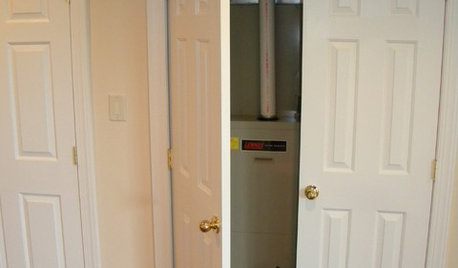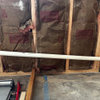Disolving water heater anode rod
genr8rs
17 years ago
Related Stories

MOST POPULARA First-Time Buyer’s Guide to Home Maintenance
Take care of these tasks to avoid major home hassles, inefficiencies or unsightliness down the road
Full StoryI have had a problem with the anode rods disolving in my water heaters since we built the house in 91. On my 3rd water heater. When the rod is gone the tank starts to leak. What started this was I had a problem keeping my dish washer filter clean. Would fill up nearly biweekly with a grit and less frequent faucet and washer screens. Eventualy 1st heater leaked and was replaced. Noticed a sedament when drained and checked anode rod. Completely gone. Now I am cued in on this. Started getting sediment again after while on new 2nd heater, checked rd, disolving, replaced with new, still cleaning screens. 2nd heater dies replaced with 3rd heater. (To clarify I have a recirculating loop to the kitchen faucet and dish washer plumbed back into the botom drain of all of the water heaters.)This time I installed a electrical wire jumper from the hot piping to the cold piping on top of heater thinking I was getting some sort of electrolisis. Now I am getting the sediment again. I installed a filter on the hot line going to the kitchen and at the same time a plumber installed a back flow valve down on the return line thinking it was flushing backwards acrrying the sediment from the bottom of the heater. That only stoped the recirculating line completely. I took out the backflow valve and now have recirculating hot water back but also have sediment. Now the sediment could be because I stired things up recently with changing the filter and flushing the lines but what is going on with the disolving rods? And is my circulating line run correctly? I am dumb founded......


bushleague
genr8rsOriginal Author
Related Professionals
Chandler Kitchen & Bathroom Remodelers · Elk Grove Village Kitchen & Bathroom Remodelers · Emeryville Kitchen & Bathroom Remodelers · Garden Grove Kitchen & Bathroom Remodelers · Glendale Kitchen & Bathroom Remodelers · Hunters Creek Kitchen & Bathroom Remodelers · Jacksonville Kitchen & Bathroom Remodelers · Oceanside Kitchen & Bathroom Remodelers · Omaha Kitchen & Bathroom Remodelers · Payson Kitchen & Bathroom Remodelers · Port Arthur Kitchen & Bathroom Remodelers · Rancho Cordova Kitchen & Bathroom Remodelers · South Jordan Kitchen & Bathroom Remodelers · Shaker Heights Kitchen & Bathroom Remodelers · Westminster Kitchen & Bathroom Remodelersguvnah
brickeyee
pjb999
lazypup
brickeyee
dan_martyn
andy_c
bripley
yekim54
mamacol
ajaynejr_aol_com
Gary808